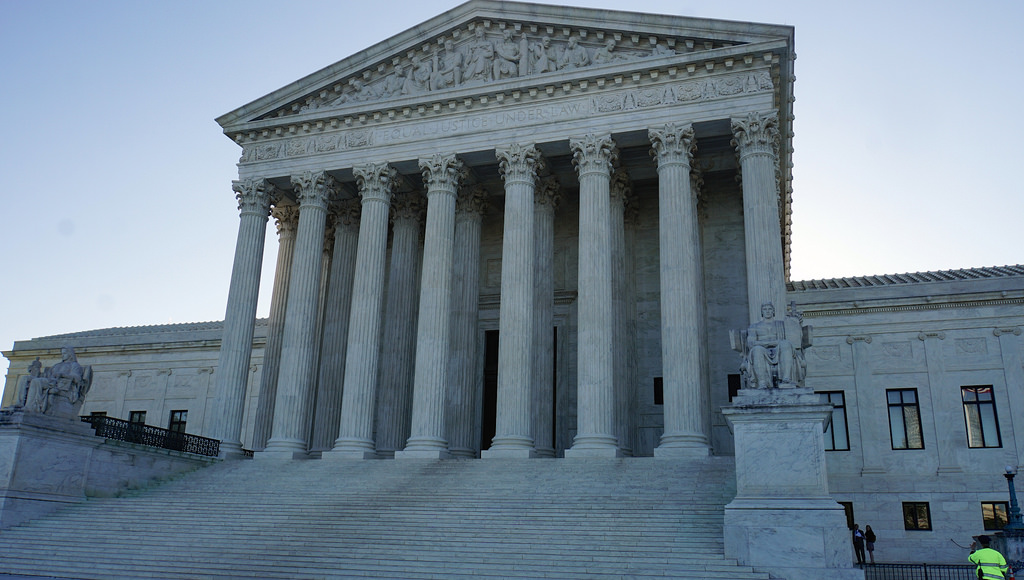The Year in Review: Privacy
As 2017 (finally) comes to an end, we’re looking back on an eventful year.

As 2017 (finally) comes to an end, we’re looking back on an eventful year. This week, Lawfare has been rounding up coverage of some of our favorite national security topics of the past 12 months (FISA Section 702 Reauthorization, L’Affaire Russe, developments in the Middle East, and the progress of counterterrorism policy). In this last installment, we're covering a topic on which readers may want a refresh: 2017 has been a big year for privacy law.
On June 6, the Supreme Court granted certiorari in Carpenter v. United States. As Jordan Brunner and Emma Khose summarize, Carpenter is a case concerning the law enforcement use of cell site records in the prosecution of two alleged robbers; the question at issue is whether the warrantless search and seizure of cell site records violates the Fourth Amendment. The court heard oral arguments on Nov. 29. Here’s Lafware’s coverage of Carpenter:
-
Amicus Brief Filed in Support of Respondent in Carpenter v. U.S.
-
Four Thoughts on the Briefing in Carpenter v. United States by Orin Kerr
-
Third-Party Party-Crashing? The Fate of the Third-Party Doctrine by Michael Bahar, David Cook, Varun Shingari, Curtis Arnold
-
In Defense of the Mosaic Theory by Paul Rosenzweig
-
Phones Move--and So Should the Law by Susan Landau
-
The Lawfare Podcast: Orin Kerr on Carpenter with Benjamin Wittes
-
The Carpenter Argument: Quick Video Reactions on Twitter and Facebook Live by Orin Kerr
And let’s not forget the DreamHost search warrant controversy:
Separately, an early Executive Order coming out of the Trump Administration sparked some commentary:
-
The “Interior Security” Executive Order, the Privacy Act, and Privacy Shield
-
What the “Interior Security” Executive Order does to Foreigners’ Privacy Rights by Stewart Baker and Zachary Schreiber
Benjamin Wittes and Emma Kohse also published an empirical study measuring the extent to which consumers trade their privacy unknowingly or consciously in exchange for convenience and efficiency.
And while related to Lawfare’s coverage of Section 702 (recapitulated in more detail by my colleague Matthew Kahn) Timothy Edgar’s book “Beyond Snowden” garnered a lot of attention from our contributors as part and parcel of our mini-symposium:
-
Parallel Universes: ‘Beyond Snowden’ and the Two Sides of the Surveillance Debate by Ben Wizner
-
“Beyond Snowden” and Transparency on Section 702 by Alex Joel
-
‘Beyond Snowden’ Falls Short on Upcoming Section 702 Reauthorization Debate by Liza Goitein
-
Reengineering Surveillance Oversight by Siobhan Gorman
-
Transparency, Public Service, and Foreign Intelligence: Thoughts on “Beyond Snowden” by Robert Litt
-
Transparency as Voyeurism by Paul Rosenzweig
-
A Wonk’s Dilemma by Mieke Eoyang
We’ve also addressed issues of data privacy and surveillance stemming from (and impacting) the EU and the U.K.:
-
No Privacy Shield, No Parachute?: The Brexit Cliff Edge and Data Regulation by Hayley Evans and Shannon Togawa Mercer
-
Why Has the EU Made So Few Adequacy Determinations? By Ariel Teshuva
-
Why the EU Has Issued Relatively Few Data Protection Adequacy Determations? A Reply by Robert Carolina
-
The Economic Case for Preserving PPD-28 and Privacy Shield by Cameron Kerry and Alan Charles Raul
-
So Much for the Privacy Shield by Paul Rosenzweig
-
The U.S.-EU Privacy Shield--Maybe Yes, Maybe No by Paul Rosenzweig
-
The European Commission’s Privacy Shield Review Summarized by Garrett Hinck
-
The US-UK Deal Is Actually Quite Good by Paul Rosenzweig
-
Amicus Brief: Microsoft Warrant Case by Paul Rosenzweig
-
Balancing Privacy and Security in Germany by Russell A. Miller
Last, for your perusal, a smattering of other thought-provoking commentary and summaries concerning privacy law and the Fourth Amendment developments in 2017:
-
Did the Special Counsel’s Access to the Transition’s Emails Violate the Fourth Amendment by Orin Kerr
-
The Tell-Tale Heart by Paul Rosenzweig
-
The Fourth Amendment Doesn’t Recognize a General ‘Right to be Secure’ by Orin Kerr
-
Standing in Data-Breach Actions: Injury in Fact? by Catherine Padhi
-
The Fourth Circuit Remands Wikimedia’s Suit Against NSA Back to District Court by Jordan Brunner, Quinta Jurecic, and Yishai Schwartz
-
Foreign Intelligence Surveillance Court Approves New Targeting and Minimization Procedures: A Summary by Jordan Brunner, Emma Kohse, Helen Klein Murillo, Amira Mikhail, and Ed Stein
-
Digital Divergence: How Digital Network Technology Threatens both Privacy and Security by David Kris
-
Trump’s Social Media Plan: Problematic Law and Policy, Pointless Security by April Doss
-
An Easy Win: Replenishing the Privacy and Civil Liberties Oversight Board (PCLOB) by Carrie Cordero
-
Follow Buddies and Block Buddies: A Simple Proposal to Improve Civility, Control, and Privacy on Twitter by Danielle Citron and Benjamin Wittes


.png?sfvrsn=1f2a75b9_5)


